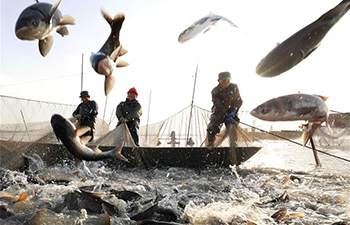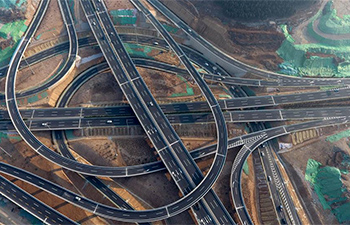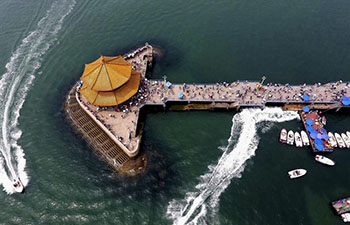JAKARTA, Dec. 29 (Xinhua) -- The waste pollution in Bali of Indonesia is so bad that local authorities recently announced a "garbage emergency" across a six-km stretch of coast on the island.
Tourists' favorite beaches such as Jimbaran, Kuta and Seminyak are included in the "emergency" area.
In the pictures shared on Twitter and Instagram, plastic straws and food packages are floating on waves and pile on the beaches.
"The amount of garbage strewn across every beach is truly heartbreaking," writes a netizen named "beeutifulbalms" on Instagram.
Real actions have started. Local authorities have deployed 700 cleaners and 35 trucks to remove debris along the coast to a nearby landfill every day since the emergency alert was launched last month.
Their workload is reportedly about 100 tons of garbage each day. However, the situation has been improving slowly.
"Because of the winds, the lovely beaches of Bali get covered in rubbish brought in by the tides," @Tim Blazey said in his tweet with pictures showing massive cleanup of the beach on Dec. 22.
This tweet echoes a AFP report on Thursday, which points out that Bali's rubbish problem is at its worst during the annual monsoon when strong winds push marine flotsam onto the beach and swollen rivers wash rubbish from riverbanks to the coast.
So far, it's hard to say whether local litterers or massive tourists should take the major blame for the Bali rubbish emergency. However, it is certain that the dirty coast has somehow affected local tourism.
Many tourists complained about the plastic rubbish they witnessed on the waters or the beaches.
Indonesia is one of nearly 40 countries that are part of UN Environment's Clean Seas campaign. As part of its commitment, the government has pledged to reduce marine plastic waste by 70 percent by 2025.
The country annually contributes, according to the AFP report, a colossal 1.29 million metric tons of marine debris, which overweighs 13 aircraft carriers as big as the USS Teodore Roosevelt -- the world's largest aircraft carrier.



















